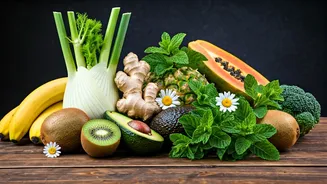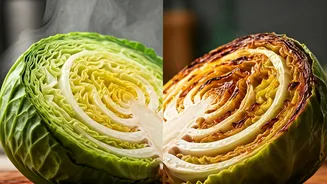Peppermint’s Soothing Touch
Peppermint has long been recognized for its ability to ease digestive issues, especially bloating. The active compound, menthol, in peppermint oil is known
to relax the muscles of the digestive tract, aiding in the passage of gas and reducing abdominal discomfort. Peppermint tea or peppermint oil capsules can be especially beneficial, providing a gentle yet effective way to alleviate bloating. This helps in soothing the gut and reducing spasms. Incorporating peppermint into your routine can offer a natural path to digestive comfort. Consider sipping peppermint tea after meals to harness its benefits. Furthermore, studies have explored peppermint’s potential role in managing Irritable Bowel Syndrome (IBS) symptoms, highlighting its widespread ability to soothe and reduce symptoms.
Fennel Seeds’ Magic
Fennel seeds, with their distinctive licorice-like taste, are packed with compounds that actively reduce bloating. These seeds stimulate the production of gastric juices, aiding digestion and reducing gas buildup. Chewing fennel seeds after meals, a common practice in many cultures, can help with the digestion of food, preventing gas and bloating. They contain anethole, which has anti-inflammatory and antispasmodic effects, easing muscle spasms in the digestive system. Fennel also reduces the amount of time food spends in the gut. Moreover, fennel seeds are a good source of fiber, assisting with regular bowel movements and further reducing bloating. They can be consumed as seeds or in tea form.
Ginger’s Digestive Aid
Ginger is a powerful anti-inflammatory and digestive aid, that helps to relieve bloating and promote digestive health. Ginger’s active compounds, such as gingerol, speed up the emptying of the stomach and reduce the production of gas. It also stimulates the production of digestive enzymes, which is important for breaking down food and preventing bloating. Consuming ginger, whether in fresh, dried, or tea form, can significantly improve digestion and reduce discomfort. For best results, ginger can be taken before meals to help prepare the digestive system. Ginger also assists in easing nausea, making it a valuable aid for overall digestive health.
Pineapple's Enzyme Power
Pineapple contains bromelain, an enzyme known for its ability to break down proteins, aiding in digestion and reducing bloating. Bromelain helps to digest food more efficiently, lessening the likelihood of gas production. Consuming fresh pineapple or taking bromelain supplements can reduce inflammation in the digestive tract. Pineapple's natural sweetness and versatility make it a simple and delicious addition to your diet. It also contributes to gut health by its fiber content, supporting regular bowel movements. Pineapple is also great for overall well-being and is an antioxidant.
Bananas: Potassium Boost
Bananas are known for their high potassium content, which can help regulate sodium levels and reduce water retention, a frequent contributor to bloating. Potassium helps balance fluids in the body, which helps in preventing bloating. Bananas are a good source of fiber, aiding in regular bowel movements and preventing constipation. Including bananas in your diet can contribute to overall gut health. The natural sugars in bananas provide energy. Bananas' versatility makes them an easy snack option for many people. Additionally, their fiber content contributes to the feeling of fullness, which is beneficial for weight management.
Yogurt and Probiotics
Yogurt containing live and active cultures, or probiotics, can help balance the gut microbiome, which is essential for healthy digestion and reducing bloating. Probiotics introduce beneficial bacteria that aid in breaking down food and reducing gas. These good bacteria improve the overall digestive system. Selecting yogurt with strains like Lactobacillus and Bifidobacterium can effectively enhance gut health. Including yogurt in your daily diet is great for managing digestive issues. It supports overall well-being, potentially decreasing the severity of symptoms of bloating. Be sure to check yogurt labels to ensure they contain live cultures for optimal health benefits.
Cucumber: Natural Hydration
Cucumbers are high in water, aiding in hydration and flushing out excess sodium, which can contribute to bloating. The high water content in cucumbers helps promote regular bowel movements. They also contain compounds that have anti-inflammatory properties, further assisting in reducing bloating. Consuming cucumbers raw or adding them to salads is an effective method to reap their benefits. They are naturally low in calories and rich in nutrients, making them a nutritious choice. The skin of cucumbers contains fiber, which aids in digestion, and the refreshing nature of cucumbers makes them a great summer snack.
Turmeric's Anti-Inflammatory Action
Turmeric, with its active compound curcumin, is a potent anti-inflammatory agent that can also help reduce bloating. Curcumin works by reducing inflammation in the digestive tract and improving digestion, potentially decreasing gas production. Including turmeric in your meals or taking it as a supplement can offer great advantages. Its antioxidant qualities support overall well-being. Using turmeric regularly in cooking, or with black pepper to boost absorption, can help manage digestive problems. The spice adds flavor and health benefits to your food. Its inclusion in your diet adds to a natural approach for digestive well-being.
Watermelon: Hydration & Relief
Watermelon, similar to cucumbers, has a high water content, aiding in hydration and assisting with regular bowel movements to reduce bloating. Its natural sugars and electrolytes can help with overall body function. The high water content of watermelon helps eliminate excess sodium, and, consequently, water retention. The fruit is also a source of fiber, which helps in regulating digestion. Consuming watermelon on a regular basis is a refreshing way to stay hydrated and support the digestive system. Its natural sweetness and hydrating properties make it a beneficial choice. It is a great food to prevent bloating. The antioxidants support good health.
Berries: Fiber and Antioxidants
Berries, such as strawberries, blueberries, and raspberries, are packed with fiber, which aids digestion and promotes regular bowel movements, preventing bloating. Fiber helps keep the digestive system functioning well. Berries also have antioxidants, which can reduce inflammation. Including these berries in your diet is a simple yet effective way to promote digestive health. They are also naturally low in calories. Fiber helps to regulate blood sugar levels. Berries can also improve gut health. Their versatility makes them perfect for snacks or as an ingredient in other food.













